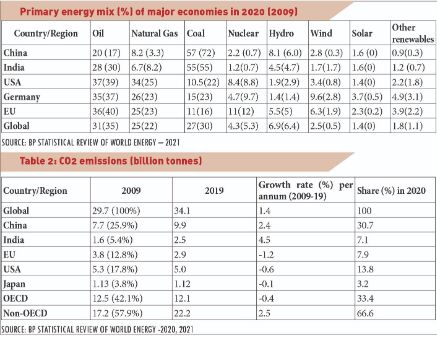Flawed pathway?
Repeated failure of UNFCCC in realising its goals, and subsequent creation of a ‘weaponising’ climate economy, calls for establishment of an alternative organisation

The 26th Conference of Parties (CoP26) of the United Nations Framework Convention on Climate Change (UNFCCC) was held in Glasgow from October 31 to November 13, 2021, where 197 countries participated. This 26th annual conference of the UNFCCC — which was established in 1994 with an objective to 'stabilise greenhouse gas (GHG) concentrations in the atmosphere' and to explore a causal relationship between the 'change of climate' and direct or indirect human activity that alters the composition of the global atmosphere — has ended with a sense of frustration among both developed and developing nations. CoP26 host, the British Prime Minister Boris Johnson, said that he was disappointed by efforts to water down the final text. "My delight at this progress is tinged with disappointment", he said. Dissatisfied activists have even suggested abandoning UNFCCC!
The developed nations were unhappy because for the first time they faced a united group, during climate negotiations, consisting of China, India, and a few other developing countries. Such a united forum of southern countries, resisting northern hegemony, was observed earlier during WTO negotiations but not in UNFCCC conferences. On the other hand, the developing countries were unhappy as they failed to put on record that 'loss and damage' be mentioned in a separate column in the climate finance reporting papers of developed countries. They argued that the rich countries are responsible for most of today's climate change impacts because they started emitting carbon much earlier than the rest of the world. Hence, it is their moral responsibility to bear the expenses of cleaning the atmosphere. Nonetheless, the Glasgow conference has addressed one long-pending issue. Six years after signing of the Paris Climate Agreement (CoP21), negotiators have agreed on rules for implementing Article 6, paving the way for more effective cross-border cooperation in the trading of CERs (Certified Emission Reductions) earned by developing countries through their participation in Clean Development Mechanism (CDM) of the Kyoto Protocol.
Historically, the European Union had set the agenda for climate negotiations. It is alleged that by employing corporate solutions for climate change, the EU's Green Deal has implanted the European neo-colonial practices. The push for greener sources of energy, particularly in the Global North (refer to table1), is driving the demand for metals like nickel, cobalt, and lithium. Labourers in mining communities working to extract these metals face dangerous and degrading working conditions. In the Democratic Republic of Congo (DRC), the use of child labour in cobalt mines is widespread. As per a June report by Al Jazeera, in Bolivia, Chile, and Argentina, lithium mining uses large quantities of water, accelerating desertification and polluting underground waters and rivers, putting the health of local communities at risk. Today, Europe imports millions of tonnes of crops and meat each year from abroad. As a result, many countries around the world are clearing their own forests to make space for land that ultimately feeds European demand.
CoP26 has seen the emergence of China as a major player in the climate economy. Since CoP15 (2009), the USA, under the leadership of Barack Obama, has started to play an active role in shaping climate policies. In 2021, China has become a major player by announcing a joint declaration with the USA on tackling climate change, including setting up a working group and reducing methane and CO2 emissions. Moreover, while defending India's move of calling for 'phase down' instead of 'phase out' of coal in the final text of the COP26 conference declaration, China asked developed countries to stop using coal first, and provide financial aid to developing countries to adopt green technologies, reported Economic Times. Table 1 clearly indicates that the global economy still depends heavily on fossil fuels, including coal, and the share of renewable energy sources is still very negligible.
India has played a very important role in CoP26 negotiations and strongly objected to the dominant attitude of the global North. Environment Minister Bhupendra Yadav has rightly reminded the world that 'Climate finance is not a charity. It is the responsibility of the developed nations. They have to fulfill it'. As per a report by The Hindu, during negotiations, India has demanded a trillion dollars over the next decade from developed countries to adapt to, and mitigate, the challenges arising from global warming, and has kept this as a condition for delivering on climate commitments made by Prime Minister Narendra Modi.
UNFCCC has failed to meet its primary objective of stabilising greenhouse gas emissions. Table 2 indicates that during 2009-19, global emissions of CO2 have increased. However, emissions in developing/emerging economies have increased substantially though in developed economies, EU; OECD it has fallen in this period. In addition to creating a huge market for green technology and 'clean air' (emission trading), UNFCCC has successfully helped the developed North to transfer carbon emission to the global South. Moreover, it has also strengthened the European neo-colonial structure by weaponising the climate crisis.
Energy plays an important role in climate negotiations. Renewable energy has failed to establish itself as an alternative source as yet. Various reports suggest that this energy is also not clean. Nickel, cobalt, lithium mining is creating new forms of colonial exploitation and environmental degradation. UNFCCC has created a climate economy but has failed to address climate emergencies. The world urgently needs a new organisation with a level playing field for all the stakeholders.
Views expressed are personals



